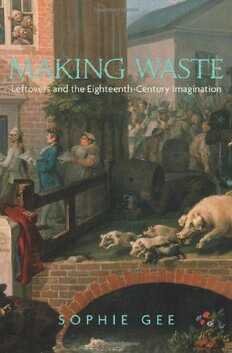
Making Waste: Leftovers and the Eighteenth-Century Imagination PDF
Preview Making Waste: Leftovers and the Eighteenth-Century Imagination
M a k i n g Wa s t e e M a k i n g Wa s t e leftovers and the eighteenth-century imagination e Sophie Gee Princeton University Press Princeton & Oxford Copyright © 2010 by Princeton University Press Published by Princeton University Press, 41 William Street, Princeton, New Jersey 08540 In the United Kingdom: Princeton University Press, 6 Oxford Street, Woodstock, Oxfordshire OX20 1TW All Rights Reserved Library of Congress Cataloging-in-Publication Data Gee, Sophie, 1974– Making waste : leftovers and the eighteenth-century imagination / Sophie Gee. p. cm. Includes bibliographical references and index. ISBN 978-0-691-13984-5 (cloth : alk. paper) 1. English literature—18th century—History and criticism. 2. Waste (Economics) in literature. 3. Literature and society—Great Britain—History—18th century. 4. Refuse and refuse disposal in literature. 5. Great Britain—Civilization—18th century. 6. Consumption (Economics) in literature. I. Title. PR448.W37G44 2010 820.9'3553—dc22 2009032667 British Library Cataloging-in-Publication Data is available This book has been composed in Adobe Garamond Printed on acid-free paper. b press.princeton.edu Printed in the United States of America 10 9 8 7 6 5 4 3 2 1 c o n t e n t s acknowledgments vii Introduction: Making Waste 1 1. The Invention of the Wasteland: Civic Narrative and Dryden’s Annus Mirabilis 18 2. Wastelands, Paradise Lost, and Popular Polemic at the Restoration 41 3. Milton’s Chaos in Pope’s London: Material Philosophy and the Book Trade 67 4. The Man on the Dump: Swift, Ireland, and the Problem of Waste 91 5. Holding On to the Corpse: Fleshly Remains in A Journal of the Plague Year 112 Afterword: Mr. Spectator’s Tears and Sophia Western’s Muff 137 notes 145 bibliography 169 index 187 a c k n o w l e d g m e n t s Making Waste is based on the doctoral dissertation I wrote at Harvard under the supervision of Barbara Lewalski, Marjorie Garber, and James Engell. I thank them for their mentoring, encouragement, and friend- ship when I was a student and for ongoing support in later years. Several senior colleagues at Princeton have also given advice and support for which I am very grateful: Claudia Johnson, Susan Wolfson, Oliver Ar- nold, Jeff Nunokawa, and Nigel Smith. Fellowships from Harvard and Princeton universities enabled me to research and write this book at home and abroad. A good deal of the work was completed while I was an Ahmanson-Getty Fellow at the Clark Library in Los Angeles; my thanks to UCLA for that award. I thank the Huntington Library in California for a fellowship that supported ad- ditional work for the project. Helen Deutsch at UCLA offered much appreciated friendship during that period. Friends and colleagues in the profession have helped me and guided my work at crucial moments. My thanks to Anna Henchman, Julie Park, Lynn Festa, Cedric Reverand, Cynthia Wall, Jayne Lewis, Dror Wahr- man, Jonathan Sheehan, Eduardo Cadava, April Alliston, Diana Fuss, Benj Widiss, Tamsen Wolff, Daphne Brooks, Jeff Dolven, and Tony Miller. Thanks, finally, to my editor, Hanne Winarsky, my wonderful copy- editor, Vicky Wilson-Schwartz, and the team at Princeton University Press. vii viii a c k n o w l e d g m e n t s An earlier version of chapter 1 appeared as “The Invention of the Wasteland: Civic Narration in Dryden’s Annus Mirabilis,” Eighteenth- Century Life 20, no.1 (2005): 82–108. I would like to thank the editors for allowing me to reprint this essay. An earlier version of chapter 3 was published as “Milton’s Chaos in Pope’s London,” in Science, Literature, and Rhetoric in Early Modern London, ed. Juliet Cummins and David Burchell (Aldershot and Burlington: Ashgate, 2007). M a k i n g W a s t e e
